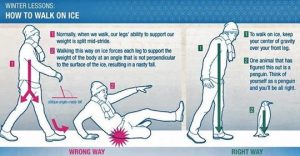 We have all heard that pride goes before a fall. It turns out that feeling down often precedes falling down as well…at least for older adults. For a number of years, there has been a well-founded suspicion among health care providers that some drugs are just bad for a person’s balance. It’s a noteworthy side effect. And, of course, add those medicinal imbalances to an older physical frame, and some unfortunate accidents can happen. Most notably, it is the fall that results in a hip fracture and the difficult recovery that represents to an older loved one.
We have all heard that pride goes before a fall. It turns out that feeling down often precedes falling down as well…at least for older adults. For a number of years, there has been a well-founded suspicion among health care providers that some drugs are just bad for a person’s balance. It’s a noteworthy side effect. And, of course, add those medicinal imbalances to an older physical frame, and some unfortunate accidents can happen. Most notably, it is the fall that results in a hip fracture and the difficult recovery that represents to an older loved one.
Researchers in Sweden have found that the chances of a hip fracture are about three times greater among 65+ year old patients on antidepressants versus those not on these medications. Closer examination over the period preceding diagnosis through actually receiving a prescription, however, revealed something that came as a bit of a surprise to doctors. The period before a patient actually begins taking a prescription for their depression actually has an even higher risk of a fall, so it evidently is not all about what just the medication can do to the patient. In the 16 to 30 day window while a patient is depressed, but before they are taking a medicine for it, they are nearly six times more likely to have a fall than non-depressed patients. The month preceding that was the second highest risk…about four times that of non-depressed patients.
What encouraged this research in the first place was the noteworthy presence of depression in hip fracture patients in hospital and recovery. While getting through the hip fracture and rehab, physicians in Sweden had noticed the relatively high prevalence of depression. This was not entirely uncommon for an older, sometimes frail or isolated population, but as they dug deeper they found that depression may have actually been a contributing factor to the fall.
Also important in predicting fall risks was age. The older the patient, the higher the risk. Men also were at greater risk for a fall than women. The researchers also note that there likely are multiple factors at work for any given person, but depression should be a red flag nonetheless.
If you have an older loved one, you should be sensitive to changes in mood…as a healthy approach all by itself. Now, you know it is also a way to look out for their fall risk. Please pass on the attached diagram about safe walking…and also encourage anyone who has more than their share of seasonal blues to see a professional. That office visit may be the step that keeps them on their feet.
Charlotte Bishop is an Aging Life Care Advisor, Geriatric Care Manager and founder of Creative Care Management, certified professionals who are geriatric advocates, resources, counselors and friends to older adults and their families in metropolitan Chicago. She also is the co-author of How Do I Know You? A Caregiver’s Lifesaver for Dealing with Dementia.





